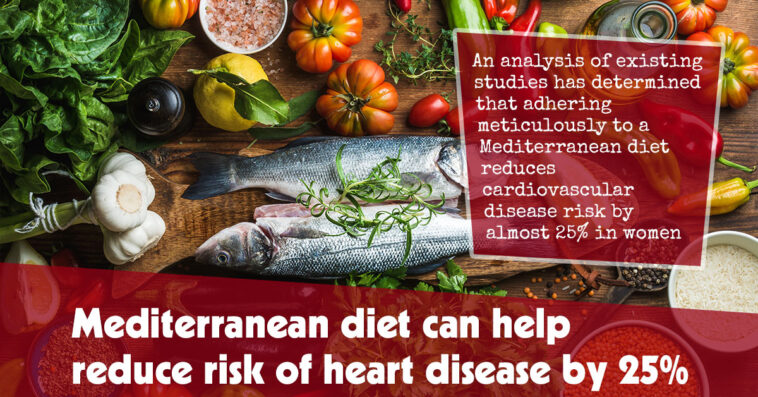Mediterranean Diet May Lower Heart Disease Risk by 25%
An analysis of existing studies has demonstrated that following a Mediterranean diet diligently reduces cardiovascular disease risks as well as mortality by nearly 25% among women.
Cardiovascular disease accounts for one third of female deaths worldwide. Although a healthy diet can play a major role in prevention efforts, most studies on this subject either do not include women as subjects or fail to provide results sorted by sex.
Current guidelines on how to reduce cardiovascular disease risks do not take gender into account.
Researchers conducted an intensive literature search to examine any studies exploring the effect of eating a Mediterranean diet on cardiovascular health and risk of dying in women.
The Mediterranean diet emphasizes fruits, vegetables, whole grains, extra virgin olive oil, nuts and legumes; moderate shellfish/fish consumption; low to moderate wine intake; and limited processed food products including animal fats dairy products processed/red meats.
From a preliminary selection of 190 relevant studies, 16 were included for data analysis. Most were conducted in Europe or America and involved over 700,000 women aged 18 years and above who had their cardiovascular health monitored over 12.5 years on average.
Analysis revealed that adhering to a Mediterranean diet closely was associated with 24% reduced cardiovascular disease risk and 23% lowered all cause death risk among women.
Coronary heart disease risk was 25% lower for individuals who adhered most closely to this diet compared to individuals who adhered least. Furthermore, stroke risk decreased but wasn’t statistically significant.
Excluding each individual study from our analysis had no discernible effect, further supporting an inverse correlation between cardiovascular disease incidence and total mortality and strict adherence to the Mediterranean diet in women.
However, researchers acknowledge a few limitations to their findings, such as all analyzed studies being observational and using self-reported questionnaires on food frequency for data collection. Potentially influential factor adjustments also varied across studies included.
Possible explanations for observed associations could include the gut microbiome antioxidant effects and Mediterranean diet’s effect on cardiovascular risk factors and inflammation.
Dietary components that include omega-3 fatty acids, nitrates, polyphenols, reduced glycemic load and increased fiber intake could all play an essential part in improving cardiovascular risk profiles.
However, the exact mechanisms underlying the Mediterranean diet’s effects on cardiovascular disease and mortality remain elusive.
Women-specific cardiovascular risk factors, including gestational diabetes, preeclampsia, premature menopause and systemic lupus can all significantly increase their chances of cardiovascular disease independently.
Preventative measures like following a Mediterranean diet that target inflammation and risk factors associated with cardiovascular disease could have different outcomes on women than on men.
